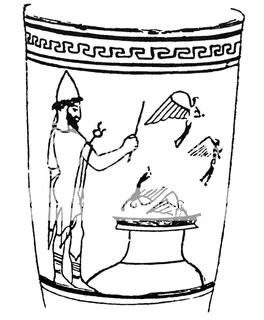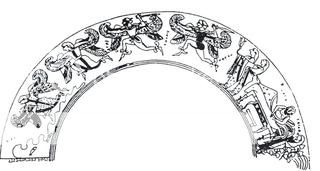ASTROLOGICAL CONCEPTS IN ANCIENT GREEK FOLKLORE - THE "KEARES"  (by Thomas Gazis)
(by Thomas Gazis)The ancient Greeks were a marvelous people in many ways. In no other period of human history and nowhere else on earth did the perceptions, the ideas, the visions, and the politics of a people reach such a high state of awareness as in ancient Greece! In no other civilization was man so important, mortal on the one hand yet similar on the other - almost equal- to the gods! In no other society was individuality so exalted and yet at the same time collectivity was considered such an utmost virtue! No other society has been so liberal and free as the ancient Greek society. This becomes obvious even by the way they used to define themselves: "Greeks are all those partaking in Greek culture" they were saying. No geographical or racial prerequiaite was necessary to become a Greek, just a cultural one! We see here a superbly free and mature statement! When we think of the Greek civilization we must bring to mind a highly humanistic and spiritual civilization, the civilization of an open, curious, restless people who was striving to find definite and lucid answers to the mysteries of life and Cosmos.
Democracy and free thinking were "invented" in Greece. You see, the Greek religious, politic and social systems were such that they encouraged freethinking, the liberal association of concepts and ideas, and the unceasing quest for the ultimate truth. The gods of the Greeks were created in their own image and they possessed many human virtues and shortcomings. So, they were not particularly fearful and menacing and the people could talk to them as friend to friend.
Additionally, the Greeks were a very energetic, optimistic and fun loving nation. With all these traits their attitude towards destiny was very advanced, and modern - as we will see. First of all, Greeks believed deeply in destiny. They had a very specific term for it: «HEMARMENE». The word «hemarmene» is the present perfect participle of the verb «Meiromai» that means: «from a dividable whole I take a particular part to which I have been allotted». «Hemarmene» then is «that particular set of experiences which has been predetermined to occur to each one of us for a deeper purpose». This deeper purpose was defined by the Greeks as «NECESSITY». The law of necessity was above every other law. «By necessity even gods are convinced» they used to say. But if the law of «Necessity» was strong, man was strong too (and this differs «Hemarmene» from «Kismet» or other types of destiny). To the Greeks each man was a unique, autonomous, highly valued «unit», a unit that almost rivaled the Gods!
Man however was but a part of a greater whole, a part of a process in evolution. Necessity is an almighty power that imposes specific, individual destinies to each man so that the totality of these destinies pays tribute to the evolution of the «Whole». We encounter some very original and advanced ideas here, ideas very modern and «astrological». And we understand the fact of the rapid diffusion of astrology in Greece after the expedition of Alexander the Great. The way was already paved centuries ago, as the Greeks believed deeply in destiny from the very beginning of their history. They would not take any important step unless they knew everything was propitious (the moment, the place, the present people). They were continuously studying the omens to find whether destiny was in their favor or against them. And they were so obsessed with that that did not mind to travel hundreds of kilometers in order to reach the two famous oracles of Delphi and Dodhoni. Predicting the future became an art.
So, even if astrology was not indigenous, the soil in Greece was very fertile for its diffusion. Actually, the widespread concept of «Hemarmene» immensely facilitated the introduction and diffusion in Greece of a doctrine that apparently was worshipping the stars and thus regarded by the rational Greeks as barbaric. But astrology soon became rife in Greece, bringing forth radical changes in Greek culture. Already in the 3rd century BC the Stoics were regarding «Hemarmene» as an astrological and not as a theological concept.
The Greeks not only had a philosophical frame propitious to astrology but also somehow developed an astrological in its essence view of life. And this they achieved having no astrological background, led only by their high awareness and by their penetrative logic! Before proceeding I have to admit that this is a new field and much research has to be done in the future. I personally drew my conclusions mainly from the work of the recognized English archeologist Jane Harrison. Harrison studied attentively some secondary figures in ancient Greek folklore called «KEARES» («KEAR» in its singular form). Some «Keares» are represented on ancient Greek pots and urns and most of them look like hardy feathered women, ugly fairies or some sort of giant bees having a human face. Very similar to the Keares seem to be the so called "Harpies".

We must remember again that Greeks had a very strong tendency to «anthropomorphize» everything, from their Gods to the most abstract concept. The Keares in reality are the anthropomorphic representation of certain concepts. Harrison researched all ancient texts and concluded that the Keares represent mainly invisible entities or energies. For example, when someone was falling seriously ill in ancient Greece people would say: "s/he has been possessed by "Keares"". And with the word "Keares" they did not mean demons. They rather meant micro - organisms or viruses! Surprisingly enough, the Greeks had invented a virus concept two thousand five hundred years ago!
And now we come to the very core of our research. Greeks had «anthropomorphized» not only the viruses but also even the vibrations of each elusive moment! If this is true -and all the indications say it is- then we have here a clearly astrological concept and a very advanced one. Each one of us experiences in life alternatively good and bad moments. When we experience bad moments it is, according to ancient Greeks, because some Keares have intruded into our place and fouled the air around us! The Keares contaminate the air, the moment becomes unpropitious and adverse and consequently everything goes wrong!
The Keares are not necessarily bad. Good Keares exist as well. The important thing is that the Keares somehow represent the good or the bad astrological influences of the moment. The best testimony of this comes from certain preserved ancient pots and urns with Keares depicted on them. These depictions elucidate rather well the nature of the Keares.

The above picture for example shows Hercules ready to slainl a Kear. This Kear has a grotesque, ugly face and can be taken either as a virus or a "bad vibration", a bad moment. In both cases Hercules eliminates the virus or the negative vibration.
The picture below shows us a scene from the famous Fineas banquet with the argonauts. According to the story, everything was flowing smoothly at this banquet when suddenly the air brought with it some Harpies who immediately spoiled the atmosphere. You can notice Fineas standing stunned on his couch while two good daemons (or argonauts?) are chasing away the Harpies brandishing their swords...

Below you can see depicted the most dramatic - probably - incident in the Iliad. Achilles and Hector are dueling to death while god Mercury stands amidst them balancing on a scale the influences of the moment in order to decide whose soul he should escort to the underworld. On the scales instead of the usual weights we notice two Keares standing there. These Keares represent the current Hemarmene of each hero, the way he is fatally related to the "spirit" of the ever shifting moment (that now becomes victorious and now becomes deadly). Thus these two Keares on the scales might very well represent the natal charts of the two heroes and their current "transits"!

Apart from the Keares another astrological figure in ancient Greece could be found in god Dionysus. Historians and archeologists agree that Dionysus and Orpheus (who actually might be just another Dionysus personification) are the most enigmatic gods in the Greek Pantheon. We know for sure that Dionysus was the god of the «Augmentative Force» of nature, the god that was assisting beings and plants to grow, prosper and thrive. Thus, Dionysus personifies the vital forces of life. The remarkable thing is that the Greeks used to represent Dionysus in four distinctive forms: one as a bull, one as a lion, one as an eagle and one as a drunken, joyful man! Now, obviously these four representations have something to do with the four zodiacal signs of the fixed cross (Taurus, Leo, Scorpio and Aquarius. The Eagle stands for Scorpio since it is his alternative occult symbol while the slightly drunken -and thus somehow transcendental- euphoric man stands for Aquarius). What is the deeper meaning behind all this? Today we know that the determination of the year’s duration was to ancients of a paramount importance (think only of Stonehedge). In remote antiquity equinoxes and solstices where taking place in the constellations of Taurus, Leo, Scorpio and Aquarius. Thus, these four constellations were considered by ancients the four «portals» opening the respective seasons. The concept of the «four portals» is once again encountered in the theories of the illustrious contemporary astrologer Dane Rudhyar. According to him the four fixed signs represent the release of the four fundamental universal powers: «the power released toward the formation of an individual being (Taurus), the power released by the individual being (Leo), the power released towards the formation of the universal being (Scorpio) and the power released by the universal being (Aquarius)». My hypothesis is that Dionysus actually personifies these four distinctive universal powers, so according to occasion is represented by one of the aforementioned sign forms. Oddly enough the same theme of the four fixed signs is repeated in the gospels and encountered in many Byzantine icons, with the four apostles taking this time the part of Dionysus.

From what we said up to now it becomes obvious that the Greeks had developed a philosophy and a religion that comprised many astrological in essence concepts. Although astrology was not rife in Greece until the third century BC we have indications that certain Greeks were thinking astrologically already during the archaic period! Take Homer, for example. In many of his verses (written around the 8th century BC) he emphasizes the fact that the destiny of each man is predetermined. But what really surprises us is a verse of his where he literary makes an astrological statement! He says (in a free translation):
«Although Polydamas and Hector were born in the very same night their fates differ much»! This might be considered as a clearly astrological statement. Homer was born in Ionia, Asia Minor, in an area that had straight ties with the Middle East. His statement is not the only astrological one we encounter in the archaic Greek literature. The Orphic Hymns (written even before Homer’s epics but comprising certain subsequent additions) have several astrological hints. In the «Hymn to the Stars» for example, there is a verse that says « Oh stars, you that determine the fate of everything…». This is more than explicitly an astrological statement. Then, a third testimony comes from Hesiod’s «Works and Days» written around 690 BC. This book advises the farmers when to perform each agricultural work according to the Moon phases and the rising of certain stars. Hesiod’s advises are astrological in their origin.
Even Plato, the most illustrious of the Greek philosophers, developed philosophical concepts that were somehow related to astrology. The most evident of them is the concept of the relation of the human soul to the stars. According to Plato the Creator makes as many souls as there are stars. Then, each soul is incarnated in a human body in order to be tested through the experiences of human existence. If one manages to master his human passions and shortcomings then his soul turns back to its original star. Thus, each star we see in the night is the soul of a man. The brighter stars actually are the souls of brighter men, of those who completely mastered their human passions. So, in a certain way Plato says that the soul is immortal and is incarnated in human beings through the mediation of the stars. And this again is an astrological concept. From Plato on, astrology slowly began to spread in Greece and its philosophy permeated almost everything, the concept of destiny in particular. The important fact is that Greeks - even though they did not develop the proper «structure» - had conceived astrological concepts long before astrology’s official diffusion in Greece. -
Thomas GazisCopyright: Thomas D. Gazis(This article is an excerpt from a lecture that Thomas Gazis gave at the international Astrology conference of Arousa - Spain in June 1998). 